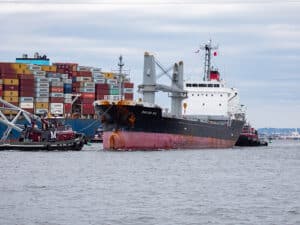
Equinor, Shell and TotalEnergies JV orders CO2 carrier duo
Written by Nick Blenkey
Each LCO2 carrierwill have a cargo capacity of 7,500 cu.m and a length of 130 meters
Dedicated CO2 carriers have gotten past the stage of being concepts that win class societies approvals in principle. China’s Dalian Shipbuilding Industry Co. Ltd. has just booked an order for two carriers, with deliveries set by mid-2024. Each with a cargo capacity of 7,500 cubic meters and a length of 130 meters, they have been ordered by the Northern Lights JV in which Equinor, Shell and TotalEnergies are equal partners.
Northern Lights is responsible for developing and operating CO2 transport and storage facilities, open to third parties, as part of Longship, a Norwegian Government full-scale carbon capture and storage project. It will be the first ever cross-border, open-source CO2 transport and storage infrastructure network and offers companies across Europe the opportunity to store their CO2 safely and permanently underground.
Phase one of the project will be completed in mid-2024 with a capacity of up to 1.5 million tonnes of CO2 per year and the two CO2 carriers.
Longship includes capturing CO2 from industrial sources in the Oslo-fjord region (cement and waste-to-energy) and shipping liquid CO2 from these industrial capture sites to an onshore terminal on the Norwegian west coast. From there, the liquefied CO2 will be transported by pipeline to an offshore storage location subsea in the North Sea, for permanent storage. Northern Lights is responsible for the transport and storage components of the project.
Northern Lights is responsible for developing and operating CO2 transport and storage facilities, open to third parties, as part of Longship, the Norwegian Government’s full-scale carbon capture and storage project. It will be the first ever cross-border, open-source CO2 transport and storage infrastructure network and offers companies across Europe the opportunity to store their CO2 safely and permanently underground. Phase one of the project will be completed in mid-2024 with a capacity of up to 1.5 million tonnes of CO2 per year.
The ships are bring built as part of the first phase of the project’s transport and storage infrastructure development. They are designed to transport liquid CO2 in purpose-built pressurized cargo tanks. Their primary fuel will be LNG, and 9ther innovative technologies, such as a wind assisted propulsion system and air lubrication will be installed to reduce carbon intensity by around 34% compared to conventional systems. The ships are the first of its kind and will potentially set a new standard for CO2 shipping on coastal trading routes.
“The award of these contracts is a significant milestone for Northern Lights,” says Børre Jacobsen, managing director of Northern Lights JV. “The use of ships will enable the development of a flexible and efficient European infrastructure network for transport of CO2 captured by our industrial customers, keeping costs as low as possible to help decarbonization scale up. I am also very pleased that these ships will be built to keep their own emissions to a minimum through use of innovative technology.”
Once in operation, the ships will load captured and liquefied CO2 from European emitters and transport it to the Northern Lights receiving terminal in Øygarden in western Norway. The CO2 volumes will be accurately measured and reported throughout the value chain. These will be independently verified, and the necessary documentation provided to regulators and customs officials.
Longship includes capturing CO2 from industrial sources in the Oslo-fjord region (cement and waste-to-energy) and shipping liquid CO2 from these industrial capture sites to an onshore terminal on the Norwegian west coast. From there, the liquefied CO2 will be transported by pipeline to an offshore storage location subsea in the North Sea, for permanent storage.




